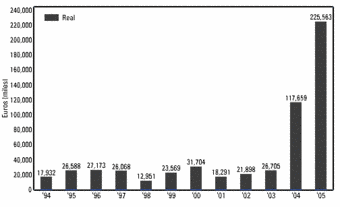Capital
 From Conservapedia
From Conservapedia For the term relating to cities, see capital city
Capital consists of a money, stock, or a store of goods and resources that has not been wholly consumed from earlier years. It is used to set the economic process in motion for the following twelve-month period. I is also the name of the famous Karl Marx's book (Das Kapital).
The term "capital" has a specialized meaning in accounting, and a broader meaning in economics.
In accounting, "capital" the net worth or stockholders' equity in a company.
In economics, "capital goods" includes anything used to produce goods, including machines, tools and factories.
Adam Smith distinguishes between two different types of capital that may be employed for the production of revenue, a fixed capital, and a circulating capital. Capital may be
| “ | employed in the improvement of land, in the purchase of useful machines and instruments of trade, or in suchlike things as yield a revenue or profit without changing masters, or circulating any further. Such capitals, therefore, may very properly be called fixed capitals.[1] | ” |
Provisions, materials, and finished work are all considered fixed capitals, as are "all useful machines and instruments of trade which facilitate and abridge labor" [2] and "those profitable buildings which are the means of procuring a revenue, not only to their proprietor who lets them for a rent, but to the person who possesses them and pays that rent for them; such as shops, warehouses, workhouses, farmhouses, with all their necessary buildings; stables, granaries, &c. These are very different from mere dwelling houses. They are a sort of instruments of trade." [3] Smith makes reference to what is sometimes today referred to as "human capital",
| “ | the acquired and useful abilities of all the inhabitants or members of the society. The acquisition of such talents, by the maintenance of the acquirer during his education, study, or apprenticeship, always costs a real expense, which is a capital fixed and realized, as it were, in his person. Those talents, as they make a part of his fortune, so do they likewise of that of the society to which he belongs. The improved dexterity of a workman may be considered in the same light as a machine or instrument of trade which facilitates and abridges labour, and which, though it costs a certain expence, repays that expense with a profit.[4] | ” |
The inventory of a merchant is a good example of a circulating capital;
| “ | The goods of the merchant yield him no revenue or profit till he sells them for money, and the money yields him as little till it is again exchanged for goods. His capital is continually going from him in one shape, and returning to him in another, and it is only by means of such circulation, or successive exchanges, that it can yield him any profit. Such capitals, therefore, may very properly be called circulating capitals.[5] | ” |
- “There is always plenty of capital for those who can create practical plans for using it” Napoleon Hill.
See also[edit]
References[edit]
- ↑ Adam Smith, An Inquiry into the Nature and Causes of the Wealth of Nations, Book II, Chapter 1, Paragraphs 5, Of the Division of Stock , First Edition 1776.
- ↑ Adam Smith, An Inquiry into the Nature and Causes of the Wealth of Nations, Book II, Chapter 1, Paragraphs 14, Of the Division of Stock , First Edition 1776.
- ↑ Adam Smith, An Inquiry into the Nature and Causes of the Wealth of Nations, Book II, Chapter 1, Paragraphs 15, Of the Division of Stock , First Edition 1776.
- ↑ Adam Smith, An Inquiry into the Nature and Causes of the Wealth of Nations, Book II, Chapter 1, Paragraphs 17, Of the Division of Stock , First Edition 1776.
- ↑ Adam Smith, An Inquiry into the Nature and Causes of the Wealth of Nations, Book II, Chapter 1, Paragraphs 4, Of the Division of Stock , First Edition 1776.
Categories: [Economics] [Business] [Factors and Methods of Production]
↧ Download as ZWI file | Last modified: 03/12/2023 06:45:27 | 204 views
☰ Source: https://www.conservapedia.com/Capital | License: CC BY-SA 3.0
 ZWI signed:
ZWI signed:
 KSF
KSF